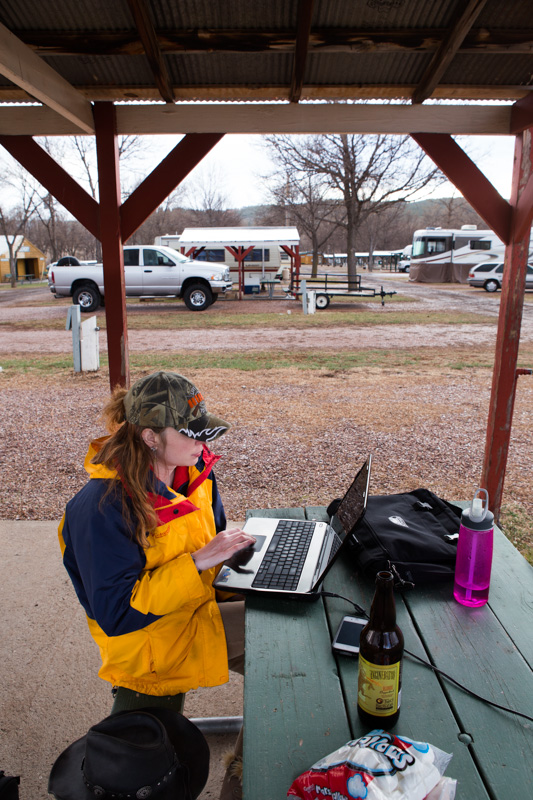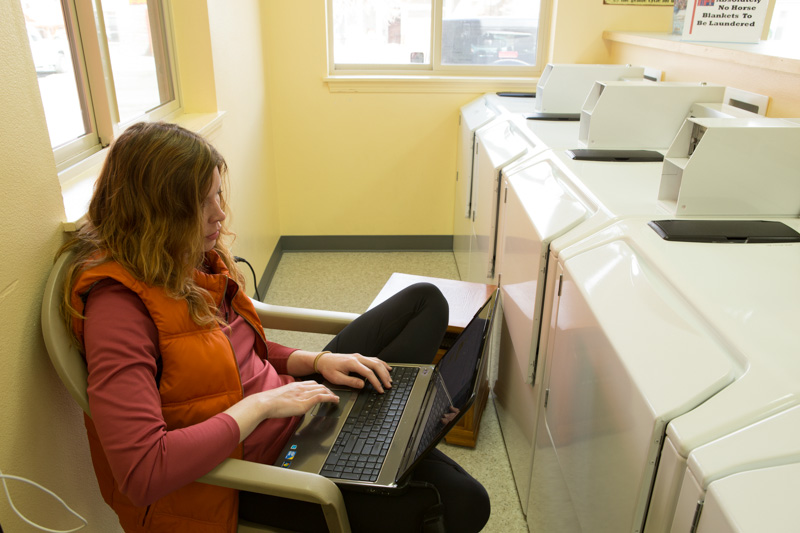After nearly a decade of showing up in an office and sitting at a desk, I became obsessed with the concept of “working from wherever.” When I began my freelance writing career, I finally felt the freedom to travel and write from the road. Although it presents its own set of challenges, campgrounds quickly became my new favorite place to work.
Campgrounds provide a sense of working outside, while still enjoying some comforts of the office. In my travels, I’ve found that each campground is incredibly different than the others, so it’s always best to call ahead to ask questions and gauge the situation. Some have WiFi, some have bug problems, some have outlets, and some have cranky hosts. Campgrounds are a bit of a gamble, and good working campgrounds are even harder to find.
For most people, camping is a way to unplug from the hustle and bustle of daily life. However, I depend upon technology to make a living and nature to inspire me.
Today is November 1st, and sadly, I realize that my camping days are coming to an end for the year. So bear with me as I reminisce about some of my favorite places to camp-work and offer some advice based on what I’ve learned so far.
My Favorite Working Campgrounds
- Happy Holiday Resort – Rapid City, South Dakota
- Champlain Adult Campground – Grand Isle, Vermont
- Melville Ponds Campground – Portsmouth, Rhode Island
- Inks Lake State Park Campground – Burnet, Texas
Occupational Hazards
- Sketchy Internet access
- Being distracted by wildlife
- Bird poop falling from trees
- Mosquito bites and pesky flies
- Campsite outlets that only charge RVs, not standard laptops
- Laptop screen glare on sunny days
- Laptops that have a less-than-ideal battery life
- Extreme and annoying wind
- Cranky campground hosts that don’t want you taking up space
- Loud, annoying campers set up nearby
- Every type of weather besides 75-degrees and mostly cloudy
Campground Working Tips
- Ask about WiFi access in advance (in the front office, pavilion, and tent sites)
- Buy a mobile 4G hot spot device, such as the Verizon MiFi, to use when WiFi isn’t available
- Check if there are outlets in the laundry room or game room to work from on rainy/cold days
- Camp next to water for the ambiance, unless the bugs are too bad
- Bring “finger gloves” so you can type in cold weather
- Invest in a laptop that has a battery life of at least 7 hours
- Drive around the campground to check the WiFi signal before committing to a site
- Stay in one location for at least 4-5 days so you can get into a work routine
- Spring for a private campground (instead of a cheaper state/national one) if the conditions will help you work more efficiently
- Pick up a bug zapper device if bug spray isn’t keeping distracting pests away
- Bring a hat to keep long hair from blowing in your face and obstructing your view
- Choose a RV campsite, even if you’re in a tent, if the outlet supports laptop charging
- Sit in the shade to preserve your laptop’s battery and avoid unexpected sunburns
- Bring headphones to drown out annoying neighbor campers
- Be friendly with the campground staff so they don’t mind you taking up space
- Make the most of your situation by taking daily breaks to explore and exercise in the outdoors
- Scope out nearby coffee shops in case of bad weather or bad Internet
If you’ve ever worked from a campground, I’d love to hear about your experience! Every workplace has its challenges. Mine just moves around a little more than it used to, and I wouldn’t have it any other way.



